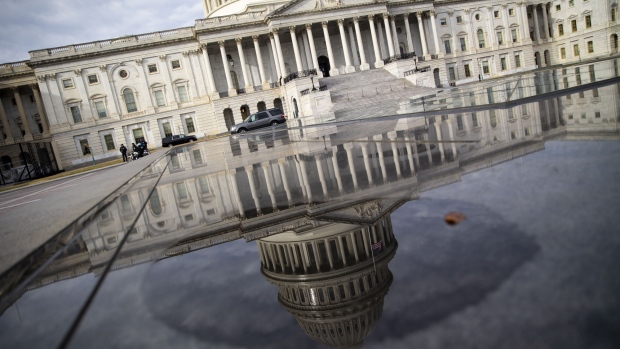Feb 22, 2019
Senators Said to Expect Drugmakers to Deflect Blame at Hearing
, Bloomberg News

(Bloomberg) -- Pharmaceutical executives looking to blame drug-plan middlemen for rising prescription costs at a Senate committee hearing next week will be greeted skeptically by lawmakers, said people familiar with the panel’s preparations.
Senior officials from seven pharmaceutical giants are scheduled to appear before the Senate Finance Committee on Tuesday to discuss soaring drug prices, which have become a lightning rod in Washington. Drug companies have long pinned climbing prescription costs on rebates that pharmacy-benefit managers negotiate when agreeing to cover certain medicines.
If pharmaceutical companies aren’t forthright about their role in increasing list prices, senators on both sides of the aisle will become more combative, said the people, who weren’t authorized to speak publicly about the preparations.
Still, pharma executives are expected to press their case that the complicated rebate system used by PBMs to ostensibly lower cost to patients hasn’t proved effective.
“It should result in lower costs for consumers, and it hasn’t,” said Adam Gluck, head of U.S. external affairs for the French pharma giant Sanofi. “If we’re going to identify solutions for patients, we need to know how the whole system is working.”
In addition to Sanofi, scheduled to appear are representatives from AbbVie Inc., AstraZeneca Plc, Bristol-Myers Squibb Co., Johnson & Johnson, Merck & Co., Pfizer Inc.
Bearing the brunt of senators’ questions does come with one advantage: PBMs and other players that drugmakers say share blame won’t be there to defend themselves.
“Pharma executives don’t mind having the stage to themselves,” said Brian Rye, a senior health-care analyst at Bloomberg Intelligence. “It’ll give them the opportunity to offer a perspective from a consistent point of view.”
PBMs have drawn of ire of the Trump administration and lawmakers from both parties for their arcane system. For example, the benefit managers sometimes pay drugstores one price for a treatment while charging a higher one to their health-plan clients. The difference, or spread, is used to stabilize drug costs, PBMs say -- or add to PBM profits, according to critics.
“PBMs were blindsided to how vulnerable their case actually was in public opinion,” said Jim Yocum, senior vice president for Connecture, which manages price transparency tools for Medicare.gov. “You won’t find many folks speaking up for them among committee members.”
Price Transparency
Republican members of the committee will probe pharmaceutical companies about price transparency and anticompetitive behavior, while Democrats will bring up ways to empower Medicare in price negotiations, the people said.
Democrats will also argue that pharmaceutical companies have colluded with the Trump administration to make it appear as though drug prices have decreased, as they’ve continued to raise list prices, said one of the people.
Hundreds of drugs saw price increases this year, according to Elsevier, a health-information analytics company. The average increase was around 7.9 percent, shows a Bloomberg analysis of data for this year through Feb. 5.
Senators from both parties also plan to address insulin costs and shortages of the drug, both of which have increased the burden on diabetic patients.
To contact the reporter on this story: Riley Griffin in New York at rgriffin42@bloomberg.net
To contact the editors responsible for this story: Drew Armstrong at darmstrong17@bloomberg.net, Mark Schoifet, Timothy Annett
©2019 Bloomberg L.P.